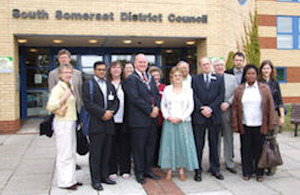DFID Research: Leaning about democracy from developing countries
Workshop gives local government and civil society leaders the opportunity to share their experiences of participation and local democracy

Champions of participation from Kenya, Bosnia, Argentina, Norway and the UK visit South Somerset District Council in June 2007. Picture: CoP
Shazia Hussain, whose job is to manage the Local Strategic Partnership and facilitate public involvement in the deprived London Borough of Tower Hamlets, first heard of participatory budgeting when she attended the Champions of Participation workshop. The event was hosted by the Development Research Centre on Citizenship, Participation and Accountability, a Department for International Development-funded research network.
The October 2007 workshop, which was also supported by LogoLink and other UK partners, brought together 44 local government and civil society leaders from 15 countries to share their experiences of participation and local democracy in the UK and beyond. The gathering represents a new model of democracy promotion.
For years, democracy promotion has been understood as the process of “exporting” democracy from those that were considered to have it - largely the older and so called ‘mature’ democracies of the global north - to those that needed it - considered to be the younger democracies in the global south. The event, however, demonstrates that a different approach to promoting democracy is possible: one that values the innovations in participatory and deliberative practices that have occurred across the globe in the last 15 years.
While at the workshop listening to a presentation by Olivio Dutra, the former Mayor of Porto Alegre, Brazil, Shazia says something clicked. “It took the whole discussion to a higher level,” …. “It just wasn’t about engagement, but active participation in decision-making.”
Read the full report from the workshop:
The Brazilian town has become famous for letting citizens decide how to spend portions of its budget. In a first stage, citizens are invited to attend local meetings to deliberate on spending priorities. Then they choose a representative to transmit their opinion at subsequent meetings. The process culminates more than a year later in a spending plan. Inspired by this example, Shazia returned to London to advocate for participatory budgeting in her own borough. As a result of her efforts, her local council has agreed to set aside £2.4 million to be allocated using some of the same methods introduced at the workshop.
Forms of participatory budgeting have spread throughout the world, and vibrant citizen and local government networks document and share their work in the field, but there are other examples of democratic innovations in the south which are being taken on board elsewhere. Participatory methods of assessment and planning, many of which emerged from the development field, have been adapted by local governments; participatory forms of building accountability, such as citizen watchdog committees, social audits and report cards, are also gaining credence.
While there is much to be learned from the so-called emerging democracies of the south, the research by the Citizenship DRC also cautions against replicating the mistakes of past democracy promotion programs which assumed that what worked in one place would also work in another. Still, this example suggests for all societies who value people’s participation in local and national affairs, a more democratic debate about democracy is essential.
See also the Project record for Development research centre on citizenship, participation and accountability - Phase 2